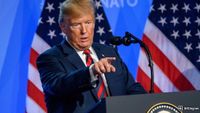Former President Donald Trump, now a presidential candidate for the 2024 elections, has taken a firm stance against implementing a Central Bank Digital Currency (CBDC) in the United States.
During a campaign speech in Portsmouth, New Hampshire, Trump pledged to his supporters that he would "never allow" the Federal Reserve to create such a currency, framing it as a stand against government overreach.

Did you know?
Want to get smarter & wealthier with crypto?
Subscribe - We publish new crypto explainer videos every week!
What is Olympus DAO? (OHM Crypto Animated Explainer)


In particular, following the response of enthusiastic applause, Donald Trump stated:
Tonight I’m making another promise to protect Americans from government tyranny. I will never allow the creation of a central bank digital currency.
Trump articulated his concerns about the potential risks CBDC poses, suggesting it could lead to unprecedented government control over individual finances.
Such a currency would give a federal government, our federal government, the absolute control over your money <...> they could take your money, and you wouldn’t even know it was gone.
This anti-CBDC sentiment is shared by fellow Republican and Florida Governor Ron DeSantis, who has also expressed opposition to central bank digital currencies. However, DeSantis recently faced a setback, trailing Trump by more than 10 points in the Iowa Republican party primary election held on January 15th.
The crypto-focused policies have also been a key part of Vivek Ramaswamy's campaign, another Republican Party contender. However, following a less-than-stellar performance in the Iowa caucus, where he received about 8% of the vote, Ramaswamy withdrew from the race and officially endorsed Trump.
Emphasizing the growing importance of cryptocurrency issues in American politics, John Reed Stark, a former US Securities and Exchange Commission enforcer, suggested that every presidential contender should appoint a "Crypto Czar." People in this position would serve as spokespersons for crypto-related matters within their campaigns, further integrating digital currency policies into the national political discourse.
Through his firm opposition to creating a CBDC, Trump is positioning himself at a crucial intersection of technology, finance, and politics. His stance resonates with a segment of the electorate concerned about government overreach in financial matters, especially in emerging technologies like digital currencies.






















